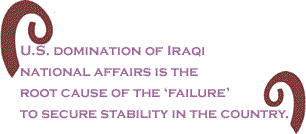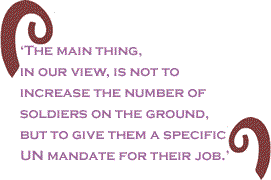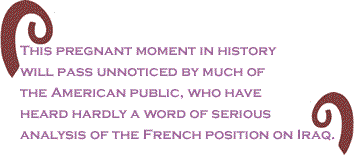| |
|

|
 We
have arrived at a pregnant moment in history. The Pirate’s furious
lunge for world domination has come undone in the place it was
to have begun. Less than six months after George Bush launched
his campaign of Shock and Awe against Iraq and, by extension,
the planet, he found himself on national television looking
shell-shocked and awful, mouthing words that amounted to a plea
for help from the international community. “[W]e cannot let
past differences interfere with present duties,” said Bush to
the world, visibly at war with his own lips. “Members of the
United Nations now have an opportunity, and the responsibility,
to assume a broader role in assuring that Iraq becomes a free
and democratic nation.” We
have arrived at a pregnant moment in history. The Pirate’s furious
lunge for world domination has come undone in the place it was
to have begun. Less than six months after George Bush launched
his campaign of Shock and Awe against Iraq and, by extension,
the planet, he found himself on national television looking
shell-shocked and awful, mouthing words that amounted to a plea
for help from the international community. “[W]e cannot let
past differences interfere with present duties,” said Bush to
the world, visibly at war with his own lips. “Members of the
United Nations now have an opportunity, and the responsibility,
to assume a broader role in assuring that Iraq becomes a free
and democratic nation.”
Bush’s
September
7 speech was labored and lifeless, as if all his energies
were consumed by the struggle not to babble, sputter and bark.
His henchpersons do little better as they flail about for language
to lend dignity – if not majesty – to their chief’s upcoming
speech to the UN. It is an impossible mission, since the breakdown
of the Bush men’s imperial venture cannot be fixed on imperial
terms. Thus, the door has been opened for – who else? – France.
Americans
are unaccustomed to coherent political speech. Their neurons
have been conditioned to respond to the bombast of Manifest
Destiny and the code words of racism, leaving the bulk of the
population incapable of rational thought. This crippling condition
– which also compels white Americans to vote against their own
interests – afflicts the U.S. information dispensing classes
in full measure. Therefore, this pregnant moment in history
will pass unnoticed by much of the American public, who have
heard hardly a word of serious analysis of the French position
on Iraq, as presented for general evaluation by French Foreign
Minister Dominique de Villepin, September 12, in the Paris newspaper-of-record,
Le
Monde.
Paris
throws down
“Everyone’s
responsibility is quite clear,” said Colin Powell’s opposite
number. De Villepin goes on to make perfectly clear that the
world crisis radiating from Iraq is the product of monumental
U.S. failure. “We are now facing the real risk of seeing the
continuation of a spiral of failure fueled by the lack of a
tangible political way forward.” The diplomat then presents
France’s own, “Not-American” plan, a UN-centered proposal that
would extract the Americans from Iraq before the
U.S. can impose strangulating infrastructure “reconstruction,”
privatization, military basing and, above all, oil rights agreements
on the battered nation.
Packaged
as a mere newspaper “article” so as to avoid the limitations
of diplomat-speak, the French position is comprehensible to
elites and politically attuned readers everywhere – except the
Delusional States of America. Although elegantly crafted, the
article all but shouts a challenge to U.S. hegemonic ambitions.
France, the “Not-American” imperialist, is seizing the moment
for which it has long prepared.
One
million white Frenchmen lived in Algeria in 1956 when the U.S.
thwarted French-British-Israeli plans to seize the Suez
Canal from Egypt. The British soon acclimated themselves
to the American shadow, while the French later developed their
own nuclear weapons capability and withdrew from the command
structure of NATO. Believing themselves peculiarly conversant
with Third World perceptions and sensibilities (based largely
on the intimate Algerian experience), and determined to preserve
French business interests and international stature, successive
governments positioned Paris as an “alternative” Great Power.
What the blustering, bulldog Americans mistook as French pretension
was, in reality, a sophisticated strategy that played against
crude, racist American bullying tactics in the Third World.
Yes, the French are imperialists, but at least they are not
Americans.
"Failure"
blamed on U.S.
In
the face of the Bush regime’s assault against international
order itself, France has chosen the path of interposition, for
which it is uniquely suited. However, no one should imagine
for a moment that the French business classes, represented by
President Jacque Chirac’s conservative government, relish this
confrontation with the U.S. (Only American – and a few British
– pundits are stupid enough to trivialize the current crisis.)
Every elite on the globe is threatened by the 21st Century version
of American Manifest Destiny. For this overarching reason, at
this moment in history France speaks for world, not just European,
opinion.

That
may not be enough to counter Washington’s arsenal of threats
and bribes, but it will not be for lack of a forceful French
posture in the real global debate, the conversation
that U.S. corporate media seem incapable of hearing, much less
reporting. Foreign Minister de Villepin is engaging everyone
but Colin Powell when he unmistakably faults the
U.S. for the “tragic cycle of disorder and violence” in Iraq.
“Far be it from us to play down the scale of the task and its
complexity, or to maintain the illusion that it’s an easy one,”
he writes. “But we have one conviction: by continuing on the
current path we run the risk of entering a spiral from which
there is no exit.”
In
the French construction, the way out requires that the Americans
move towards the exit under a speedy, UN-supervised process.
U.S. domination of Iraqi national affairs is the root cause
of the “failure” to secure stability in the country, leading
to pervasive insecurity. “France is ready to work within the
Security Council with the United States and the other countries
on the ground for the benefit of Iraq,” said de Villepin. “But
we must put an end to ambiguity, which would lead to a failure
for the Iraqi people, with the risk of discrediting the international
community.” The minister is appealing, here, to the United
Nations as an institution. Every delegate is aware of the U.S.
executive’s disdain for the world body, stark and recent memories
that Bush’s speech on Tuesday cannot possibly erase.
De
Villepin next addresses European capital, which is far more
heavily involved in the Middle East than its American counterparts:
“We
all realize that the problem goes beyond Iraq: it’s the
stability of the Arab and Muslim world that is at stake. In
the Middle East, an exclusively security-oriented approach is
only maintaining the cycle of violence and reprisals at the
risk of destroying political prospects. This approach – let’s
be brave enough to say it – is leading nowhere. Far from promoting
stability, it is fanning resentment, incomprehension and frustration.”
Translation:
The Americans are defecating in the pool, creating conditions
in which no foreigners will be able to do business. Simultaneously,
France is presenting itself to Arabs and Muslims as the “not-Americans”
– a responsible, trustworthy partner for a sovereign Iraq.
“Iraq
is a land of memory. Her attachment to her traditions and her
identity have already led her to reject the outside control
that some have tried to impose.” The “some” that de Villepin
refers to could only be Britain, the former colonial power in
Iraq, and/or the U.S., the current boss-occupier. Diplomacy
would not permit such language, but the Le Monde platform allows
de Villepin to speak more bluntly, and to interpose France between
Anglo-American ambitions and Iraqi sovereignty. “Today it is
urgent to transfer sovereignty to the Iraqi people themselves,
to allow them to fully shoulder their responsibilities.” De
Villepin continues, “only the prospect of a sovereign political
destiny can nurture hope and allow the society to rebuild itself.”
In
the environment de Villepin inhabits, the carefully chosen words
“allow the society to rebuild itself” is eant to undercut the
U.S. argument that its Halliburton-Bechtel “reconstruction”
projects – the envisioned infrastructure of dependence – are
cause for continued occupation. This is certainly a message
that the Bush Pirates can decipher, although the point is not
made for their consumption.
The
source of insecurity

The
Americans constantly beat the security drum to justify the occupation.
France maintains that the occupation fuels insecurity.
“Does
that mean the immediate departure of coalition forces? Certainly
not. Indeed, there are many who justly stress that such a move
would create a vacuum worse than the current situation. These
forces could remain under the command of the main troop contributor
[the U.S.]. Should more countries participate? The main thing,
in our view, is not to increase the number of soldiers on
the ground [italics ours], but to give them a specific UN mandate for their
job – one that has a time limit and requires submitting regular,
detailed reports to the Security Council.”
The
language in italics subverts the American contention that maintenance
of its motley “coalition of the willing” is the central task
in Iraq, and that contribution of troops to the coalition conveys
special rights to Iraqi resources (Poland’s expectation and
rationale, for example).
The
U.S. should relocate to the borders of Iraq, largely vacating
the cities where the American presence is the source of instability
and insecurity. Such is the clear thrust of the Frenchman’s
remarks, although coated with softening language. “In particular,
one of the priorities today is to secure the borders and put
a stop to infiltrations. A redeployment of coalition forces
could be considered, in cooperation with the Iraqis, in order
to address this major risk.” The Iraqis would secure the cities
and, presumably, the oil fields, themselves:
“That
requires calling to some extent upon demobilized Iraqi forces,
whose know-how will be indispensable to re-establishing security
in a lasting way. The same thing should be done for the police
force. In the long run, we could achieve a division of responsibilities
more respectful of Iraqi sovereignty and no doubt more effective
as well: external security as a priority for UN forces and domestic
security for the Iraqi authorities.”
The
Americans have no intention of becoming an Iraqi border patrol
– although an overstretched and emotionally drained U.S. military
may soon find these are the only duties they can handle.
Sovereignty
is paramount
The
French propose that the U.S.-appointed Governing Council and
ministers “would be considered by the UN Security Council as
the guardians of Iraqi sovereignty during the transition period.
Very soon, perhaps in a month, an interim Iraqi government could
be established based on these bodies with executive powers progressively
transferred to it, including economic and budgetary activities.”

The
key phrase here is “guardians of Iraqi sovereignty.” French
intentions could not be clearer, fully justifying Colin Powell’s
huge discomfort at last weekend’s meeting of Security Council
member ministers, in Geneva. France is most keen to close the
legal door to the United States creating further “facts on the
ground” designed to entangle the Iraqi nation in an American
corporate embrace – forever. The international drama is not
about a few French, German or Russian oil contracts here and
there, no more than the U.S. invasion was launched for the sole
benefit of Halliburton and Bechtel. France is challenging U.S.
claims to a super-national right to manipulate or erase the
sovereignty of nations – the legal basis for world order and
the only way that civilized nations know how to do business.
In this, France speaks for the world, no matter how selfish
her motives might be.
So critical
is the question of Iraqi sovereignty, France is willing to accept
the handpicked Governing Council on an interim basis in order
to move the prize a square or two away from grasping American
hands.
The
French “timetable should provide for all the stages of a constitutional
process with the aim of presenting a draft text by the end of
the year. A general election could be envisioned as soon as
possible, by spring 2004.”
France
appears to be betting that the Iraqi appointees will find new
backbones and the energy to actually work on a constitution,
should there emerge a real prospect for, in de Villepin’s words,
“placing the Iraqi people at the heart of the reconstruction
process.” If the U.S. interferes, the onus will be on Washington.
The
very idea of independent Iraqi action is anathema to the Bush
men, who are determined to hold the nation’s sovereignty in
limbo until the U.S. can somehow conjure up a collaborationist
social base for American rule by proxy – something that Iraqi
resisters will not allow to happen. Secretary of State Powell
has been reduced to sounding exactly like a 1950s British –
or French! – colonial governor: “The worst thing that could
happen is for us to push this process too quickly before the
capacity for governance is there and the basis for legitimacy
is there and see it fail.” (AP,
September 14.)
Powell
is wrong. Legitimacy-wise, worse things are already happening.
The five most prominent appointees in the 25-member Governing
Council – including the erstwhile favorites of the Pentagon
(Ahmed Chalabi) and the CIA (Ayad Alawi) – this week demanded
a quick end to the occupation. The other three members represent
the largest Shiite political organization and both Kurdish factions
( Washington
Post, September 15). It seems they’ve been talking to the
French.
On March
20, the day the American tanks crossed the Kuwaiti border
bound for Baghdad, we wrote:
War
is the great and terrible engine of history. Bush and his Pirates
hope to employ that engine to harness Time and cheat the laws
of political economy, to leapfrog over the contradictions of
their parasitical existence into a new epoch of their own imagining.
Instead,
they have lunged into the abyss, from which no one will extricate
them, for they will be hated much more than feared.
In attempting
to break humanity's will to resist, the Bush Pirates have reached
too far.
Whatever
happens at the United Nations next week – even if France blinks
– the Bush men have definitively failed in their deluded mission.
And they will continue to fail, because they are unfit for civilization
as it is evolving.
|
| |
|
|
|



